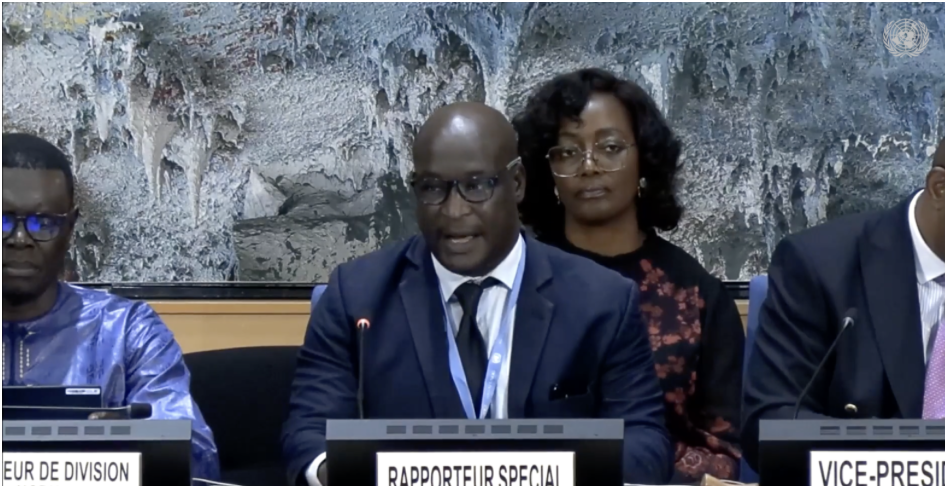
Burundi’s crisis : A call for acknowledgement and accountability
60th session of the Human Rights Council
08 September – 08 October 2025
Item 4: Interactive dialogue with the Special Rapporteur on Burundi
19 September 2025
By Marcela Miteva/GICJ
Executive summary
During its 60th Human Rights Council Session, on 19 September 2025, in an Interactive Dialogue, Mr. Fortuné Gaetan Zongo, the Special Rapporteur on the situation of Human Rights in Burundi upon his findings, raised serious concerns about the arbitrary arrest, prolonged detention, torture, enforced disappearances, attacks against journalists, sexual violence, freedom of the media, and expression, free elections, expropriation of land and property by the state as a form of oppression towards minorities and opposition sympathizers, and finally, institutionalized discrimination against women.
The Special Rapporteur expressed concern about the lack of cooperation on behalf of the Burundian government, which, according to him, signals a distancing of oneself from the Human Rights Council’s decisions.
Besides the findings presented by various experts and state parties about the human rights situation in Burundi with a focus on the abovementioned issues, some of the panellists flagged their disapproval of the imposition of the mandate of the Special Rapporteur on Burundi without the country's consent. The speaker of Burundi, Ms. Elisa Nkerabirori, also shared this view, claiming that it infringed on their state’s sovereignty and violated some of the enshrined principles of international law and the UN Charter.
Geneva International Centre for Justice (GICJ) remains deeply concerned about the ongoing reported enforced disappearances of political motives, as well as the cruel and inhuman treatment in detention centres. GICJ believes in the non-impunity principle and calls for the immediate provision of adequate legal remedies for victims as well as the strengthening of an independent judicial system.
Background
The debate at the Human Rights Council involved the report of the Special Rapporteur for the situation of human rights in Burundi. The debate shows a highly polarised interpretation of the development of the country, with vigorous disagreement regarding the legitimacy of the Rapporteur's mandate, the state of democratic freedoms, and the general state of human rights, all the more against the background of recent and upcoming elections.
One of the core points of contention revolves around the political crisis which began in 2015. Different member states and civil society organisations view the current stalemate as a continuation of the crisis, defined by persistent impunity for historical and ongoing atrocities. The principal stumbling block for a solution to the crisis, according to the Special Rapporteur, rests with the Burundian government's "denial" of a crisis. The Burundi government and its allies, however, frame the mandate as a foreign-led mechanism, driven by a political agenda as a covert putsch against the government since 2015.
Major Areas of Thematic Discussion:
- Elections and Civic Space: The June 2025 local and legislative elections were the focal point. The Burundi government and the national human rights institution (NHRI) defined the elections as peaceful, calm, and widely participated in. The European Union, the UK, and various civil society organisations expressed grave concern regarding the process's credibility. They mentioned a declining civic space, suppression of voices from the opposition, intimidation of voters, as well as exclusion of opposition candidates, which resulted in what one of the speakers referred to as "absurdly high results" for the governing party. There exists widespread concern for the time leading up to the 2027 presidential elections.
- State Sovereignty vs. International Review: The Burundian government strongly advocated for the sovereignty of the country, alleging the mandate of the Special Rapporteur violates the principle of respect for state sovereignty from the UN Charter. This line was also taken by the African Group and many other states, which contended that mandates without the authorisation of the state concerned are unproductive and the preferred methods are cooperation and dialogue. The EU and others, however, remained insistent upon the need for the mandate and emphasised the limited cooperation of Burundi with the UN mechanisms and the latter's continued refusal of access by the Special Rapporteur to the country.
- Human Rights Violations and Impunity: The government's opponents cited a consistent trend of grave human rights violations. They involve extrajudicial executions, enforced disappearance, arbitrary arrest, torture, and widespread sexual and gender-based violence, all with a pattern of impunity. Human rights defenders, as well as media and civil society figures, are the principal targets for repression and intimidation. The NHRI also denounced abduction and forced disappearance and demanded change, including the release of media and human rights figures detained by the state.
- Ethnic Tensions and Refugees: The Burundian representative accused the Special Rapporteur of making "dangerous and irresponsible" allegations with "ethnic overtones" by reporting on the discrimination and property rights violations targeting the Tutsi community. The speaker questioned the Rapporteur's authority to speak on behalf of the Tutsi community, framing the mandate as a "tool of division". The situation of Congolese refugees was also a contentious issue. While the DRC thanked Burundi for hosting refugees fleeing conflict, the Special Rapporteur's report noted discriminatory practices against them, particularly those from the Banyamulenge community.
Typically, the argument unearthed two mutually exclusive narratives: one, presented by Burundi and the supporting states, of a democratically independent nation that enjoys progressive advances in statecraft and peace-building and undeservedly accused by a politically biased United Nations process; and another presented by the Special Rapporteur, the West, and the human rights community, of a state embroiled in a decades-long crisis wherein violations of the human rights flourish unaccountably and democratic space diminishes.
Summary of the Expert’s report
The Special Rapporteur on the situation of Human Rights in Burundi presented his key findings in the opening of the session, acknowledging both the endeavours of some civil societies in the protection of human rights and, noted with concern, the serious violations of Burundi’s international obligations. In his statement, Mr. Fortuné Gaetan Zongo claimed that the lack of protection for people’s rights comes from the weak institutions, lack of an independent justice system, which he referred to as a “mere mirage”, the weak national human rights mechanisms and the political interferences.
He then provided an analysis of the irregularities that characterised the elections held in Burundi in 2023, where the political opposition was highly overshadowed through its exclusion and intimidation and violence of sympathisers for the political opposition. He thus expressed his concern about the fairness of the elections, which resulted in the current ruling party receiving over 96% of the overall votes. The Special Rapporteur claimed that for the summer of 2024, 14 politically motivated enforced disappearances were reported.
Additionally, in his findings, he registered that over 77,000 Congolese sought refuge in Burundi, which, in part, contributed to discrimination and worrying violations by the managers of refugee camps.
On the topic of discrimination, Mr. Zongo signalled that the recent legislation for the primacy of customary law in gender equality, as well as the laws and practices on law and inheritance, further undermine gender equality.
Among these issues, he affirmed that Burundi has the highest index of hunger, where 2.2 million Burundians face regular food insecurities. One of the major sources of the impoverishment was argued to be the land and property appropriation, which was the reality faced mainly by minorities and opposition sympathisers. The victims of such confiscations did not receive either the necessary compensation or adequate legal remedies.
Finally, Mr. Zongo named the pressing issues which then became the focus of the statements delivered by the experts and state representatives, namely: arbitrary arrest, prolonged detention, torture and other cruel or inhuman treatment, enforced disappearances, excessive restrictions on the freedom of expression and peaceful assembly, as well as attacks on journalists.
Summary of the Interactive Dialogue
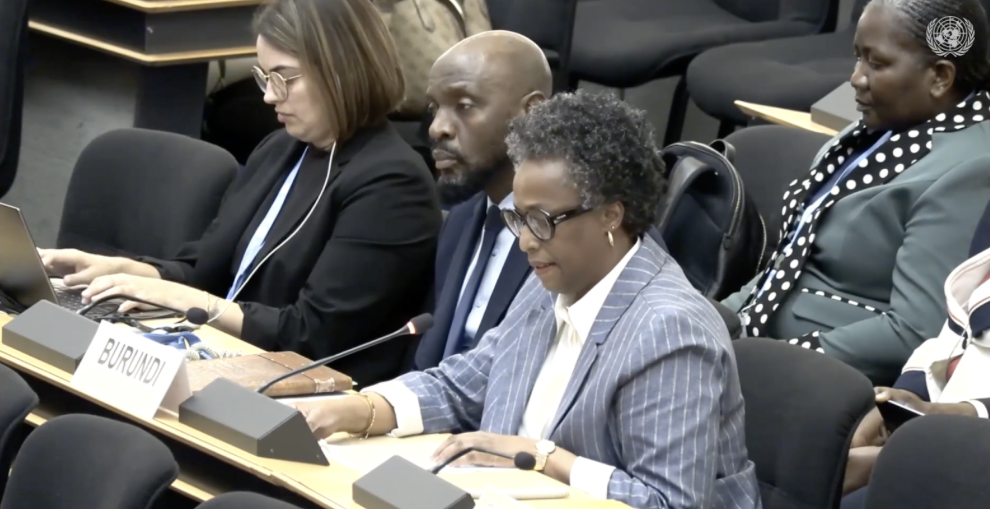
The respondent country was represented by Ms. Elisa Nkerabirori, who spoke on behalf of Burundi. She began her speech by providing counter-arguments to the allegations made by the Special Rapporteur. She stated that Burundi successfully concluded legislative and local elections in a safe and peaceful environment, which she claimed to be recognised by all international observers who responded to the call of the government to monitor the procedure.
As to what concerns the treatment of the Congolese refugees after the big influx in February, she stated that they have” been living peacefully for 20 years now”. She then claimed that an interference in the bilateral relationship between the two states is in breach of the provisions of the UN charter.
She disagreed with the rapporteur’s report, raising questions about the integrity of the Special Rapporteur and the mission of the Council. The allegations made were envisaged by her as defamatory. According to her, the Special Rapporteur presented a report that was biased towards the Tutsi community in Burundi. She also claimed that categorisation of communities is what characterised the findings of Mr. Zongo.
Ms. Elisa Nkerabirori concluded her speech, stating that the imposition of the mandate of the Special Rapporteur on Burundi without its consent is an interference with state sovereignty and an infringement on some of the enshrined principles of international law and the UN Charter.
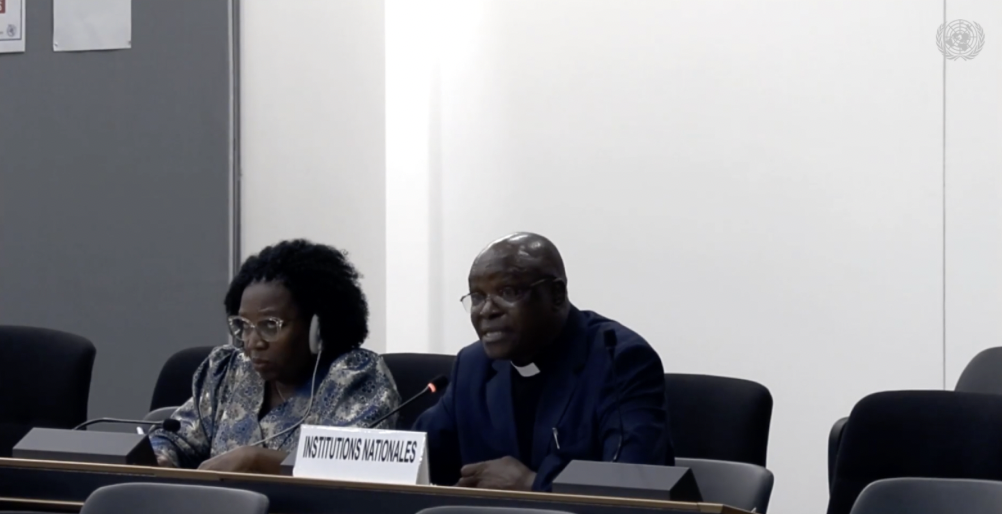
After Ms. Elisa Nkerabirori delivered her statement on behalf of Burundi, the Vice President invited Mr. Martin Blaise Nyaboho, who spoke for the NHRI Burundi Commission Nationale Indépendantes des Droits de l'homme.
In his statement, he presented both the positive and the negative aspects of his findings on the situation in Burundi. He reiterated Ms. Elisa Nkerabirori’s position that the 2025 legislative and local elections were conducted in a peaceful manner, which was also mentioned by the speaker of Burundi. Unlike the Special Rapporteur, who condemned Burundi’s government for the lack of cooperation, which hindered the proper execution of his mandate, Mr. Nyaboho praised its efforts in that respect. Despite the fact that he explicitly praised the Burundian government for taking legislative steps to decriminalise certain press activities, he did not provide in concrete terms, not even a single act. Lastly, he acknowledged the crucial role of NHRI in the safeguarding of the Paris principles.
The areas of concerns on which he focused were the poor prison conditions, enforced disappearances and the abductions, which he claimed to "run counter to criminal justice", and the politically motivated crimes, for which he suggested an expansion of the legal framework of the criminal code. Among the prison concerns, he reiterated the overcrowding and advocated for the separation of prisoners with mental illnesses into specialised centres and the immediate release of prisoners who have served their sentences.
Finally, he made two recommendations for the Burundian government, i.e the need for a law on amnesty to ensure the liberation of certain prisoners who, in the first place, did not deserve to be placed there. He stressed that there should be facilitated procedures for conditional release, especially for human rights defenders. He further recommended the urgent need for protection of journalists, and that those who were detained without due process of the law be released.
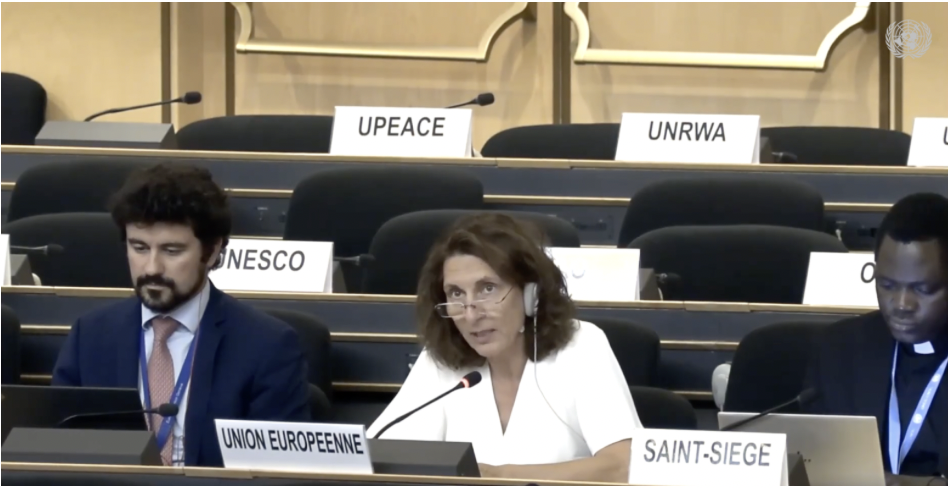
The European Union’s statement remained deeply concerned by the persistent violations of human rights in Burundi. They highlighted the abusive governmental restrictions on the freedom of assembly, peaceful association, and community meetings and condemned the institutional tools used to instil fear, especially among members of civil societies, journalists and human rights defenders.
They agreed with the findings of the report of the Special Rapporteur, calling out the lack of cooperation by the state and urging to grant of access to the country for the SR. She also questioned the credibility of the election results as well as the lack of independent institutions. The EU emphasised the importance of the establishment of "truly independent" national human rights institutions through transparent and inclusive procedures.”
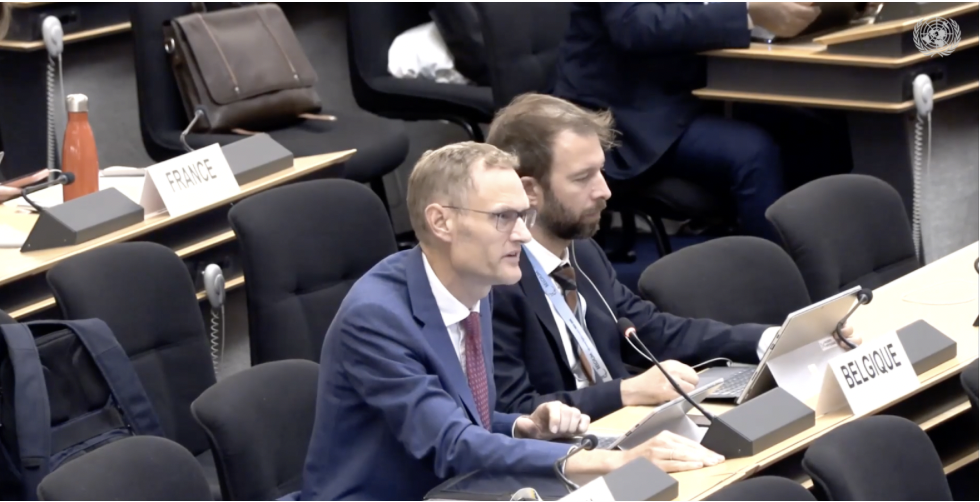
The Delegate from Belgium reported that his country aligned itself with the position of the EU and urged Burundi to cooperate in a constructive manner with the Special Rapporteur. Mr. Payot expressed Belgium’s support towards the mandate of the Special Rapporteur and highlighted the importance of investigating all the reported cases of enforced disappearances, extrajudicial executions and torture, and encouraged Burundi to set up mechanisms to prevent a repeat of such occurrences. He further stated the intolerance towards violations of freedom of expression and invited the Burundian government to learn from the obstacles and irregularities that marked the elections in June 2025 and ensure that the next electoral cycle is better. He concluded, stressing that political pluralism is an essential prerequisite for democratic vitality and that the structural discriminations faced by women should be properly addressed.
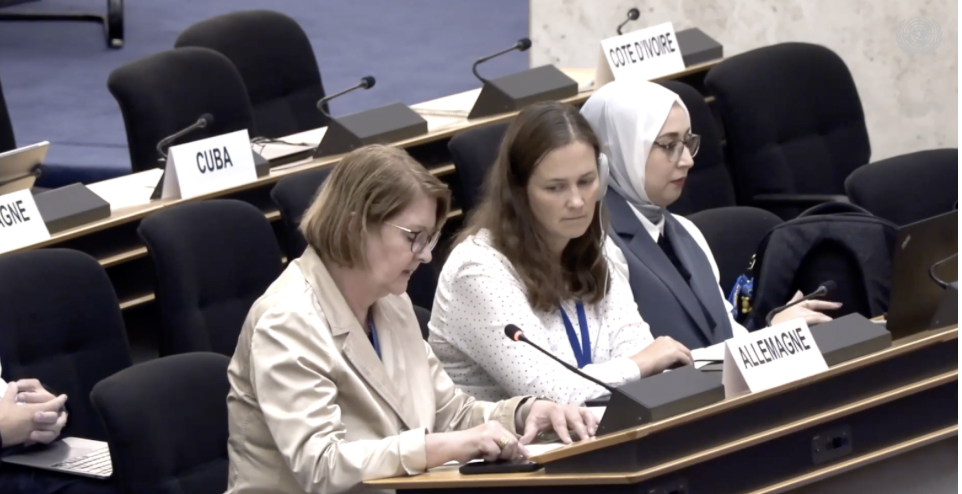
Germany, on whose behalf Ms. Antje Leendertse spoke, like Belgium, also supported the European Union in its position. Germany stated that it is primarily troubled with the reports about violations of fundamental rights, namely: the arbitrary detentions, enforced abductions, torture and discretionary limitations to the freedom of expression. Ms. Leendertse incites Burundi to “ensure full access to justice for all victims of Human Rights violations violations which have so far often enjoyed impunity.” It further reiterated the concerns about the impartiality of the National Human Rights Commission and affirmed that the utmost priority is that their mandates are executed independently. In addition, it called on Burundi to cooperate with the Rapporteur and allow the reopening of the human rights office of the United Nations.
She concluded her statement by asking the Special Rapporteur, “What more can the international community do to improve and support Burundi in assisting and improving the human rights situation, including the situation of the refugees?”
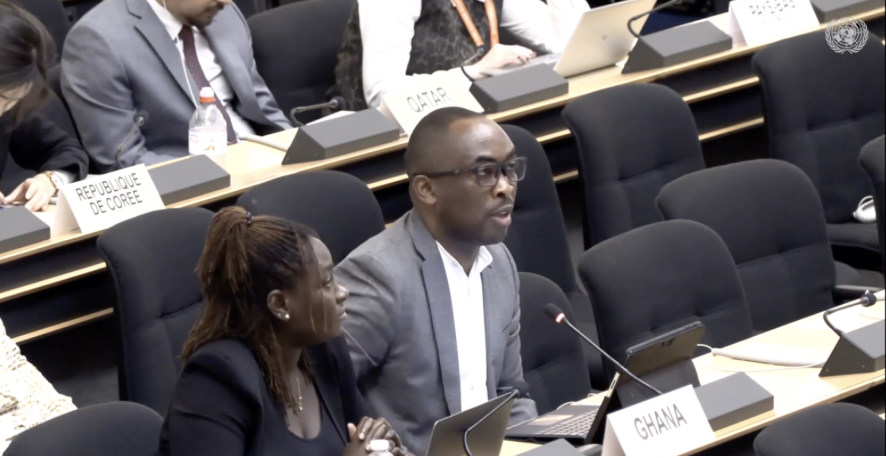
The Delegate from Ghana, speaking on behalf of a Group of African States, stated that they strongly believe in universality, objectivity and non-selectivity and that they oppose politicalization and double standards. Mr. Antiwi reaffirmed Burundi’s position about the principle of non-imposition of the mandate of the Special Rapporteur without the consent of the state concerned, since this is a direct undermining of the sovereignty of the state. He further stressed that the promotion and protection of human rights should be the result of cooperation and genuine dialogue. He then congratulated Burundi on the initiatives it has taken in consolidating the human rights situation, including its constructive engagement with the Universal Periodic Review mechanism and also with treaty bodies. He finally invited the international community to accept the efforts by the Burundian government and support it further.
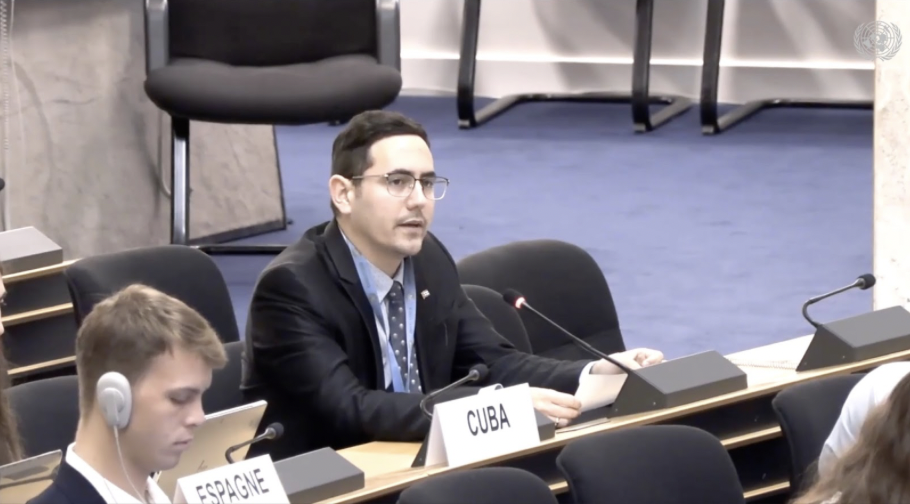
In support of Burundi's claim was Cuba, which rejected the imposition of punitive and selective mechanisms without the approval of the country concerned. He stated that this is a direct violation of the principles of respect for sovereignty, independence and self-determination of peoples, which are enshrined in the United Nations charter. Another point he made is that those same instruments do not produce any positive effects but exhaust the resources of this body and are “doomed to fail as they perpetuate confrontation”. According to him, the only effective way to create a change in the field of the promotion of human rights is through “dialogue and constructive cooperation based on mutual respect and noninterference in the internal affairs of states”.
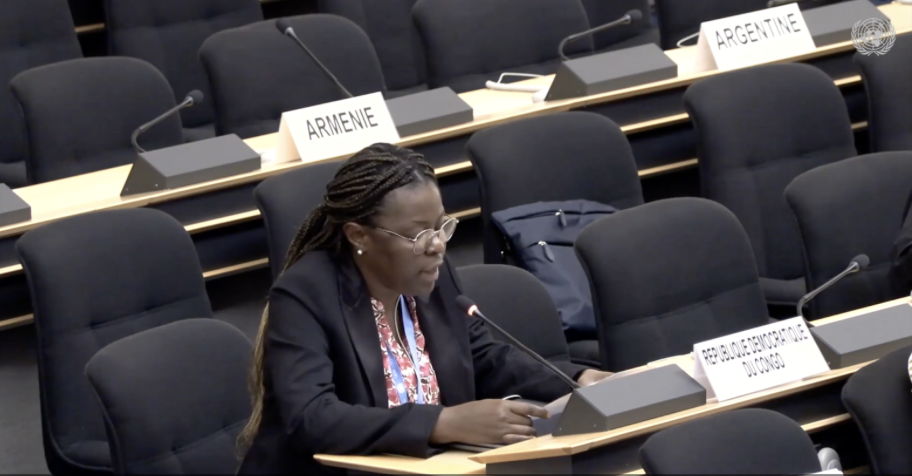
The Democratic Republic of Congo announced that it aligns itself with the position of the African Group of States. She thanked the Burundian state for welcoming the Congolese refugees following a large invasion of the country, and she also urged the international community to provide financial support for them. Although she recognised the social and economic challenges faced by the country, she praised the ”recent political evolutions in the country, especially in the organisation of legislative local organisations that were safe, peaceful, and inclusive.”
Civil Society and Non-Governmental Organisations
Non-governmental organisations expressed their support for the Special Rapporteur. They expressed serious concerns about serious human rights violations. Burundi has not implemented meaningful reforms to mitigate the longstanding concerns about justice and accountability. Furthermore, they confirmed the findings of the Special Rapporteur on the way in which the elections in 2025 were held and the serious breaches of the democratic principles of the rule of law. This also raised worries about the procedural aspects and further abuses of the upcoming elections in 2027. The organisations urged the Council to renew the mandate of the Special Rapporteur.
Conclusion
The session concluded with the final remarks of the Special Rapporteur, Mr. Fortuné Gaetan Zongo, who urged that the first step towards an improvement of the human rights violations is a recognition of the issues present. He then urged the Burundian government to engage in a constructive and inclusive dialogue that would lead to a roadmap of further actions. He states that free elections in 2027, halt of impunities and land expropriations, creation of impartial inquiries into human rights violations, as well as an independent justice system, should be the utmost priority of the government. Mr. Zongo acknowledged that the Burundian people aspire to the principles of peace, justice, dignity and human rights, but that they need external support to get there. In his final words, he concluded that there is a need for trust rebuilding, strengthening of institutions and full reconciliation.
Position of Geneva International Centre for Justice (GICJ)
Geneva International Centre for Justice (GICJ), in light of the evidence presented by the Special Rapporteur, condemns the 14 reported enforced disappearances in 2024, most of which were the result of political affiliations. Furthermore, GICJ is greatly concerned by violations of human rights, including arbitrary arrests, prolonged detention and inhuman treatment, especially in the detention centres. GICJ urges Burundi to strengthen its national human rights mechanisms by ensuring an independent justice system, enabling adequate judicial remedies for the victims, and thus also abiding by the principle of non-impunity. GICJ invites the Burundian government to present itself before the Special Rapporteur and engage in a constructive dialogue on methods for improvement.




